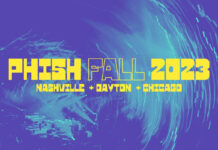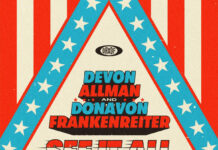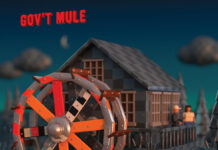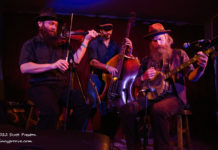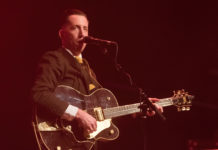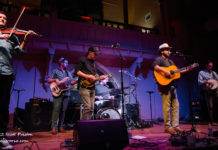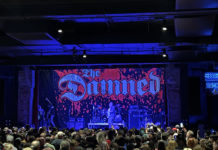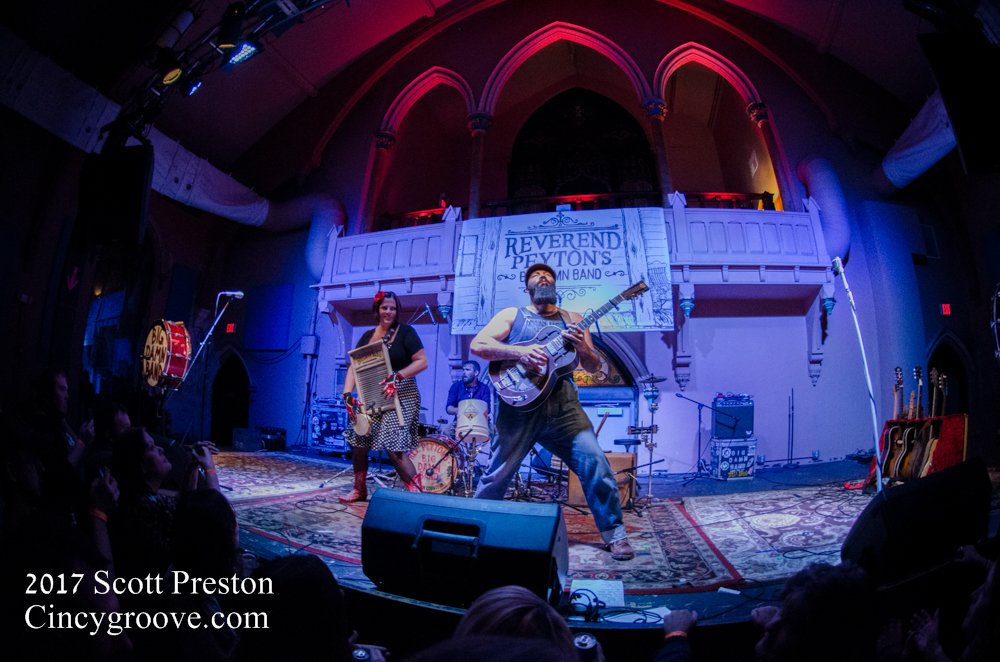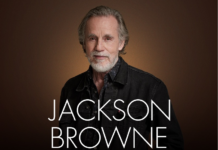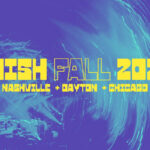
In Jim White’s 100-mile-a-minute mind, so many thoughts flit about, one has to wonder how many escape before he can grab them. Considering how many he does manage to transform into award-winning short stories, visual- or performing-arts installations and most notably, songs, we’re guessin’ gazillions.
So prodigious is White’s song output, when Athensoutfit the Packway Handle Band sought him out to produce an album, the quintet learned he had a massive stash of bluegrass songs just waiting to be sprung on the world — and they would make the perfect slingshot. “When I’d heard ’em play a couple of years earlier,” White says, “I muttered under my breath, ‘I wish I could have that much fun playing music.’ When they offered me the chance to produce, I thought, ‘How can I undermine this?’” The answer is Take It Like A Man, the new Yep Roc Recordsrelease by Jim White vs. the Packway Handle Band, due out January 27, 2015.
Describing it as “a synthesis between their zany bluegrass sound and my long-suffering, implosive-depressive novelist view of the south,” White says it fulfills his “conniving goal to become a happy bluegrass man.”
Sounding like an ivory-tower academic one minute and a stand-up comedian the next, he explains that term versus addresses the “conflagration of opposing mindsets” as an answer to the question, “What happens when we throw these two unlikely elements together?”
Though White says it took a bit of wrangling to make his devious plan work, Packway guitarist Josh Erwinassures no punches were thrown. In fact, the band sought White’s involvement precisely because they felt the need for some objective guidance. After more than a decade of playing their brand of “apocalyptic infotainment” together, the quintet — four of whom have been connected since high school — wanted to branch out. First exposed to White’s eclectic music via a Texas DJ at the 2006 Burning Man festival, they became fans after viewing the BBC documentary Searching for the Wrong-Eyed Jesus, inspired by and taking its title from his 1997 debut album, The Mysterious Tale of How I Shouted Wrong-Eyed Jesus.
While producing The Skipperdees’ 2013 album, Some Bright Mourning, White needed a bluegrass band as accompanists and called the Packways. A good time was had by all. They decided to tap him for their next project.
“He directed the concept,” Packway fiddler Andrew Heaton explains. “He went through our songs, and with some needed frankness, told us which ones he thought would and would not work. And after he provided us with 20 of his, we told him which ones we were going to do. So he had the majority of the say on our numbers and we had the majority of the say on his.”
The album alternates between White and Packway compositions; only one track, the campy bluegrass rave-up “Corn Pone Refugee,” is a co-write (credited to White and Erwin).
Despite the “versus” construct, Take It Like A Man is actually about connecting, White notes. “The whole point with anything artistic is to unify, to draw together,” he says. “I try to do that with every project, and often the long shots are the most interesting propositions.
“One of the most beautiful qualities about bluegrass is its simplicity,” White muses. “It’s incredibly elaborate moment to moment, but the overall arc is usually really simplistic. It’s more about the quality of the voice than the virtuosity of the player. And you can take five homespun voices and put them together on a bluegrass harmony, and all the sudden, something magic happens.”
It certainly occurs in the first single, “Not A Song,” by Packway mandolinist Michael Paynter. It’s an infectious, upbeat melody fueled by clever lyrics and la-da-da harmonies; White says his eight-year-old daughter started singing along the first time she heard it. “I always wanted a song that my kids would happily sing along with,” he says. “That was a fine moment.”
Says Heaton, “We put a lot of time into trying to write something that seemed more relevant or contemporary. We got so far with it and were satisfied we had done a pretty good job. But when Jim heard it he found four or five fundamental limitations that he changed. It went from something that had a huge amount of potential and would certainly be one of our fans’ favorite songs, to something that might actually appeal to a wide audience.”
The success of their mutual boundary-stretching can be heard in every one of these 11 songs, and is spilling over into their joint performances as well. “I’ve always had a cinematic approach and don’t approximate it especially well live,” says White. “They are one of the best live bands you’ll ever hear. They don’t get too wrapped up in the notion of self reflection or philosophy; they just go out and have fun. And at this point in my life, I want some of that action.”
His previous label had spurned his bluegrass-leaning songs, White says. “So I was always in the closet as far as bluegrass was concerned. I got to come out on this record. I got to sing those harmonies that I really like. And a lot of that mindset is a world that I’m fascinated by.”
That would include the sometimes “comic and surreal” place where bluegrass meets religion in Southern culture, a place he captures in “Jim 3:16,” which features understated picking by Erwin and banjo player Tom Baker. In it, White not only makes the irrefutable observation, “a bar is just a church where they serve beer,” he also calls out rockabilly legend Sleepy LaBeef. The story harks back to when White, “a card-carrying heretic,” was asked to participate in a Sunday-morning gospel sing at the Calgary Folk Festival following the release of Wrong-Eyed Jesus.
“So there I was at this religious sing, and up walks Sleepy LaBeef, the legendary whiskey-drinkin’, Nudie suit-wearin’, hell-raisin’ rockabilly legend. I figured I had some heretic company for a lively theological musical dialogue with the white gospel bluegrass bands sharing the stage,” White recalls. “So I sang a song called ‘God Was Drunk When He Made Me.’ The bluegrass groups did not take it well, fomenting the Pentecostal equivalent of Jihad, wanting to Jihad my ass right off the stage. I looked over at Sleepy for moral support and he smiled at me and muttered in his whiskey-soaked baritone, ‘You will burn in hell for that song, boy.’ Then he went to the mic and said, ‘I know I have a rep for being a bad man, but six months ago, I rededicated my life to Jesus.’
“He followed me around that whole festival tryin’ to win me back to the Lord,” White says. “When I got home, I started trying to figure out what I would have should have said back to him if I’d thought of it. That song is my mission statement to Sleepy LaBeef. Nobody ever wanted it on a record because it’s sort of a gimmick song. When I showed it to these guys, they’re like, ‘Hell, yes, we’re putting that on the record.’”
Then he goes on a tangent involving LaBeef’s pre-salvation role in a soft-core porn film by Ron Ormond, whom White calls “the most fascinating artistic character ever.” It’s quite the tale; White’s got a beguiling yarn for nearly every song on the album, though some, like the reason he included “Wordmule Revisited,” are relatively straightforward. In that case, he wanted to try “a crazy bluegrass version” of the original, which appeared in the TV show Breaking Bad.
In the hands of White and the ebullient Packway Handle Band, the whole album adds up to a huge dose of fun, though the track “Sorrow’s Shine” — a unanimous Packway pick — is, White says, his way of letting fans know he’s still in touch with his serious side.
“I don’t want to get too lost in this fun-loving bluegrass thing,” he admits, adding how much he values humor and whimsy as a uniting force. Which remains his ultimate point of music-making, too.
“I have this idea about popular music,” he says. “The verse is all about the individual; the chorus is about all about the union with others. When you get to the chorus, you want everybody to feel like this is their part where they get to join in. It feeds into my fundamental ideas about energy in the universe, which is that there are two forms of energy: The force of separation and the force of union. And the interplay between the two is how everything happens. It’s the metaphysics of pop music.”
For those who prefer to skip Professor White’s metaphysics class, just jump to the chorus and chime right in.
Feel free to inform your readers: The album is available for pre-order now at iTunes: http://smarturl.it/eu6n58

